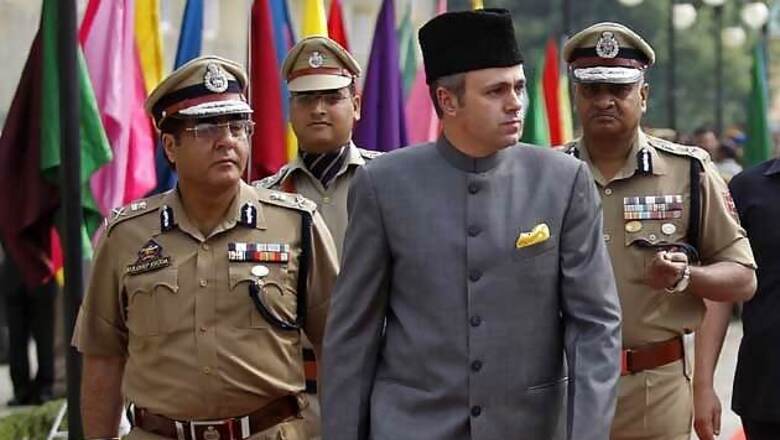
views
Srinagar: With the National Conference (NC) President and former union minister Farooq Abdullah out of the picture in the Jammu and Kashmir Assembly elections due to 'health reasons', Chief Minister Omar Abdullah is struggling to cover the lost ground in Valley. It will be an uphill task for NC, which has governed Jammu and Kashmir - barring a few years - since the Indira Gandhi-Sheikh Mohammad Abdullah accord in 1975, to maintain its political relevance in the state.
However, the only ray of hope for the ruling party this time is, if it manages to secure a respectable number of seats and then form a coalition government with any other party including BJP, which is trying to make inroads into the Valley and is expected to do well in the Jammu region. Peoples Democratic Party (PDP) has already announced that it will not form a post-poll alliance with the BJP. But, PDP has kept its option open for an alliance with the Congress.
Meanwhile, political experts believe that anti-incumbency sentiments are at a record high in the state, but it would not matter if the voter turnout is not high. "Unpopular decisions by the government during its six year term, which were later reversed after a total whitewash in Lok Sabha elections, could also play an important role in NC's political future," they said.
"Despite the fact that some of them were reversed by the government, the people are unhappy with the overall governance of NC-led government," they said, adding the handling of the 2010 unrest and relief and rehabilitation work following recent floods in the Valley are also 'unsatisfactory'.
Meanwhile, sources close to Omar said that he had been left alone by his ministers, as they were all busy campaigning in their respective constituencies for the last over 6 months.
Farooq Abdullah:
Even though Farooq was not able to retain his Srinagar Lok Sabha in the recent parliamentary elections, his absence from the electoral scene would be greatly felt on the ground as he knows the art of engaging the masses. "My father (Farooq Abdullah) is unwell," Omar, who is also the working president of NC, said, adding "He is not there to advise me and will not campaign for the NC."
Farooq, who was on dialysis, has not been in good health for the last few years. Doctors have advised that he needs a kidney replacement. Farooq's British wife Molly will donate her kidney to him, sources said. A four-time chief minister, Farooq has been a Rajya Sabha member since 2002 and also held a Cabinet portfolio in UPA-II.
Omar Abdullah:
Political experts question Omar's decision to quit his family political bastion Ganderbal fearing rout from the constituency as it will be not be easy for him to get mandate from Sonawar and Beerwah, the two seats he will test his luck in the Assembly polls. Sources in the NC say the party leadership is worried about the fate of Omar in Sonawar despite it being his home constituency because the people are angry with him as the local administration completely failed to tackle the situation during and after floods in the Valley.
The performance of the NC in the constituency in the last Assembly elections wasn't reassuring either. In the Assembly election held in 2008, Omar's father Farooq Abdullah won Sonawar seat by just 94 votes. However, PDP's Sheikh Ghulam Qadir Pardesi, who came second in the Assembly polls in 2008, defected and joined the NC before by-elections which was held after Farooq resigned from the seat to contest Lok Sabha elections.
It is also interesting that Omar chose Beerwah constituency in central Kashmir district of Budgam as his second option, instead of retaining Ganderbal. Since its creation in 2002, Beerwah has been a stronghold of PDP.
In 2002 Assembly election it was won by PDP's Mohammd Sarfaraz Khan while in 2008 the seat was retained by the party with Shafi Ahmad Wani being the winner.
Reacting to criticism over his decision to quit Ganderbal, Omar said he took the decision two years ago. "Having decided two years ago that I wouldn't seek re-election from Ganderbal I have continued to work for the constituency and will always do so," Omar tweeted.
Commenting on his decision to fight from two seats, Omar wrote, "So when PM candidates do it we take it as a sign of weakness too or are we conspicuously silent at that time?"
Meanwhile, the resignation of senior leader and MLC Sheikh Ghulam Rasool from NC's primary membership and its Central Working Committee and joining the PDP over Omar's decision to not seek re-election from Ganderbal is another setback for the ruling party.
In his resignation letter, Rasool said that because of deterioration in the party affairs, people are now alienated with the party. "I could not accept the mandate offered to me by president Dr Farooq Abdullah and you (working president) to contest from Ganderbal," he added.
Earlier, in January longtime NC loyalist Sheikh Ghulam Ahmad Saloora resigned from the party, alleging that the party leadership was more concerned about grabbing power than to take care of the people. He went on to apologis to the people of Ganderbal for the fake promises he had made to the people on behalf of Omar during 2008 Assembly polls.
Rasool and Saloora played a very important role in Omar's win from Ganderbal in the 2008 Assembly elections. Omar, who joined politics as a Member of Parliament in 1998, was then the youngest minister at the age of just 29 years, after he was elected to the Lok Sabha from Srinagar constituency of Jammu and Kashmir.
But the 13-month-old NDA government was ousted by one vote on April 17, 1999 when NC MP Prof Saifuddin Soz defied the party whip and voted against Vajpayee government.
Omar was re-elected for the second term as an MP and took charge as Union Minister of State, Commerce and Industry in the then Vajpayee-led government. From July 23, 2001 to July 23, 2002, he remained the Union Minister of State for External Affairs under the NDA government, led by the then prime minister Atal Bihari Vajpayee. In 2002 his father Farooq Abdullah passed on the party's leadership to him when he became its new President.
Abdullah family and Ganderbal constituency:
The relationship of the Abdullah family and Ganderbal goes way back to 1975, when Omar's grandfather and NC founder Sheikh Mohammad Abdullah, after abandoning the plebiscite demand and joining mainstream politics, fought election from the constituency. After Indira Gandhi-Sheikh Abdullah accord in the same year, the sitting Congress Member of Legislative Assembly (MLA) from the constituency Mohammad Maqbool Bhat vacated the seat for him. Sheikh Abdullah later won the by-election and became the chief minister of the state.
At the end of the NC-Congress coalition government in 1977, Sheikh Abdullah again fought election from Ganderbal and won. After Sheikh Abdullah died on September 8, 1982, the baton was carried forward by his son and Omar's father Farooq, who contested from Ganderbal constituency three times - 1983, 1987 and 1996 - and won them each time.
After Omar decided to enter the state politics and took over party affairs, he too chose Ganderbal to make his debut. Even though he lost the Assembly seat to PDP's Qazi Mummad Afzal in 2002, Omar avenged his defeat by defeating him (Qazi) in 2008 by a margin of more than 8000 votes.
(Abid Soffi is Managing Editor 'Kashmir Pioneer. He lives in Srinagar)

















Comments
0 comment